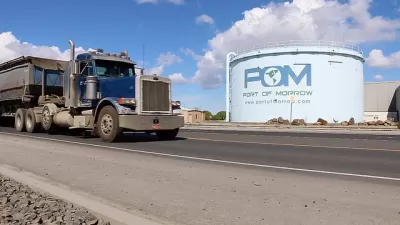Decisions, Decisions. What's the best way to add transportation fuels to California's cap-and-trade program? Charge a carbon tax at the pump, as Senate leader Steinberg proposes, or charge refineries in the same manner as applied to other industries?
"California’s cap-and-trade system currently affects only industrial plants – but next year, it’s set to expand to vehicle fuels too. Now, Senate Leader Darrell Steinberg (D-Sacramento) says he wants to exempt those fuels from cap-and-trade – and implement a carbon tax instead," writes Ben Adler. [Also on audio].
In essence, the decision is whether to charge consumers at the pump or have refineries participate in a carbon auction, and pass on the added costs to consumers. "Steinberg hopes that a straightforward carbon tax would be better received by consumers than the complicated cap-and-trade pricing mechanism," writes Marc Lifsher in the Los Angeles Times.
The proposal doesn't seem to be going over well - with some fellow Democrats and environmentalists.
- "Cap and trade is the preferred approach," said Derek Walker of the Environmental Defense Fund in San Francisco, wrote Lifsher.
- Sen. Fran Pavley (D-Agoura Hills), who wrote California’s landmark greenhouse gas reduction law, says a carbon tax would conflict with AB 32’s overall goal of reducing climate change “… because it sends mixed signals to the major emitters – where some now are under a cap required to roll back, other people get a free pass, the motorists pay,” writes Adler.
Another way the carbon tax would deviate from cap-and-trade would be how it distributes the revenue. Rather than combining auction revenues from refineries with other Cap-and-Trade Auction Proceeds, it would "(r)eturn two-thirds of the Carbon Tax revenues to poor and middle-income Californians through a state Earned Income Tax Credit for families making less than $75,000 per year," wrote Steinberg in his press release.
Interestingly, the oil industry that has fought gasoline and oil royalty taxes in the past, is neutral, writes Adler, "but business groups don’t like the proposal. They argue companies and consumers would pay more at the pump."
In fact, Steinberg acknowledges gas prices will go up regardless – under cap-and-trade or a carbon tax. “And it may not be popular to say, but that’s necessary. Higher prices discourage demand.”
FULL STORY: Steinberg: Replace Cap-and-Trade With Carbon Tax for Vehicle Fuels

Alabama: Trump Terminates Settlements for Black Communities Harmed By Raw Sewage
Trump deemed the landmark civil rights agreement “illegal DEI and environmental justice policy.”

Study: Maui’s Plan to Convert Vacation Rentals to Long-Term Housing Could Cause Nearly $1 Billion Economic Loss
The plan would reduce visitor accommodation by 25% resulting in 1,900 jobs lost.

Planetizen Federal Action Tracker
A weekly monitor of how Trump’s orders and actions are impacting planners and planning in America.

Restoring Northern India’s Himalayan ‘Water Temples’
Thousands of centuries-old buildings protect the region’s natural springs and serve as community wells and gathering places.

Milwaukee to Double Bike Share Stations
Bublr Bikes, one of the nation’s most successful, will add 500 new e-bikes to its system.

DC Extends Application Window for Outdoor Dining Permits
District restaurants will have until the end of November to apply, but businesses with permits in rush hour parking lanes must end operations on July 31.
Urban Design for Planners 1: Software Tools
This six-course series explores essential urban design concepts using open source software and equips planners with the tools they need to participate fully in the urban design process.
Planning for Universal Design
Learn the tools for implementing Universal Design in planning regulations.
Caltrans
Smith Gee Studio
Institute for Housing and Urban Development Studies (IHS)
City of Grandview
Harvard GSD Executive Education
Toledo-Lucas County Plan Commissions
Salt Lake City
NYU Wagner Graduate School of Public Service




























